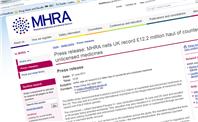The MHRA have today issued the press release below. This is presented exactly as published and without comment.
Press release
Date: 27 June 2013
Time: 12:00
Subject: MHRA nets UK record £12.2 million haul of counterfeit and unlicensed medicines
Contact: Press Office 020 3080 7651
or press.office@mhra.gsi.gov.uk
Out-of-hours 07770 446 189
The MHRA today announced that it seized a record £12.2 million of counterfeit and unlicensed medicines in the UK. This was part of a week-long international crackdown on the illegal internet trade of medicines that seized over £26.8 million globally.
The crackdown – called Operation Pangea VI - was conducted between 18 June and 25 June and resulted in 58 people being arrested worldwide. This operation has also resulted in 9, 610 illegal online websites that were selling counterfeit and unlicensed medicines being closed down or suspended through domain name or payment facility removal.
Coordinated by INTERPOL and carried out by 99 countries across the globe, the operation targeted the three main elements misused in the illegal website trade – the internet infrastructure, the electronic payment system and the mail delivery service.
Internationally, preliminary results show that more than 522,000 packages were inspected by regulators and customs officials resulting in the seizure of over £9.9 million doses of unlicensed and counterfeit medicines worth approximately £26.8 million.
In the United Kingdom, enforcement officers from the MHRA, with assistance from the Home Office UK Border Force and local police, raided addresses in connection with the illegal internet supply of medicines.
This activity resulted in more than 3.7 million doses of unlicensed medicines worth approximately £12.2 million, including 97,500 doses of counterfeit pills being seized in the UK worth £525,000. The types of medicines the MHRA found were those for slimming, hair loss and erectile dysfunction.
The MHRA’s Acting Head of Enforcement, Nimo Ahmed, said: “During one week we have seized £12.2 million worth of counterfeit and unlicensed medicines. These were being stored in unacceptable conditions and supplied through illegal internet websites without prescriptions by people who are not qualified to dispense medicines.
“When people buy medicines from an illegal website they don’t know what they’re getting, where it came from or if it’s safe to take. The dose could be too high or too low, or the ingredients could break down incorrectly in the body which makes the medicine ineffective. They could also become victims of credit card or identity fraud as well as downloading computer viruses.
“We have closed down 1288 of these illegal websites but people need to take the time to see their GP about any problems they have with their health. People are far more likely to get better faster if they are on the correct course of safely prescribed medication.”
This year’s closure of illegal websites follows on from last year when approximately 18,000 illegal pharmacy websites were shut down through domain name or payment facility removal.
A representative from Home Office UK Border force said: “The work carried out by Border Force officers as part of this joint operation makes clear just how seriously we take the smuggling of fake and unlicensed medicines.
“Smugglers are only out to make a profit. These goods are often dangerous and the proceeds can be used to fund serious organised crime.”
The Royal Pharmaceutical Society’s Neal Patel, said: “It is hugely worrying that prescription medicines are available from illicit websites. This is a serious patient safety issue.
“Not only is supplying prescription only medicines without a prescription illegal, it means that the user has no information about the ingredients, dosage instructions, or potential side effects, so patients would not be receiving proper healthcare advice.
“We would urge the public if they wish to buy medicines online to always check that they are dealing with a genuine pharmacy.”
If someone suspects their medicine may be counterfeit, contact the MHRA’s designated 24-hour anti-counterfeiting hotline on 020 3080 6701 or counterfeit@mhra.gsi.gov.uk.
The release is available online and as a downloadable PDF from:
mhra.gov.uk/NewsCentre/Pres...
Rod

